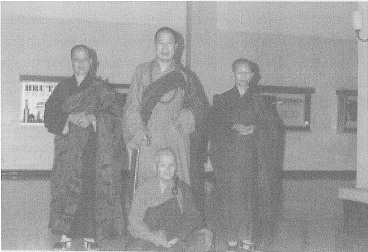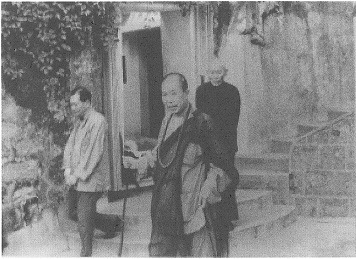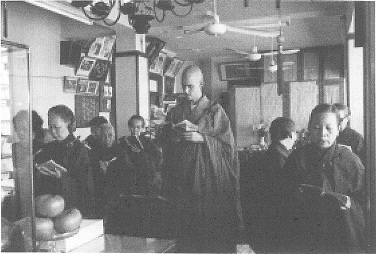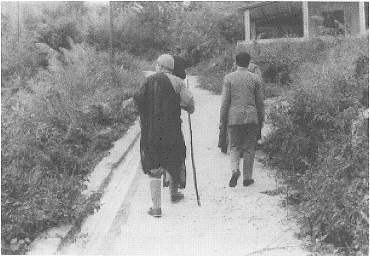|
那麼我這一次走了之後,關於這個香港的佛教講堂,你們每一個人願意給我寫信,我都歡迎。你們哪一個給我寫信,我一定會看的。不單會看,連一個字都不會落空的;甚至你有「一二三四五六七八九十」,哪一個字也不會丟的,我都看得清清楚楚。但是回信不回信這不一定,因為我太忙了!太忙了,我也不願意寫信。為什麼呢?我今天很坦白的告訴你們,因為我沒有讀過書,也不會寫字,寫出來的字,在中國人說,「像蟑螂爬」似的。那麼外國人寫字不管它好不好,寫那個雞腸的字,那麼彎彎曲曲的,他不注重這好不好,所以我寫字也寫得不好。我也不願意我這個字留到世界上,因為有的人看師父寫的字,雖然不好,他也想留一留,喔!這將來當古董賣。那麼我也不願意我這個字將來做為古董,所以我也不願意寫信。我這很坦白、很清楚告訴你們,因為這個關係:第一是忙,第二我寫不好字。
到台灣、香港,他們以前都這麼給我宣傳,說是我不認字,怎麼會講經呢?我在台灣講經的時候,喔!很多人就給我這麼講:「他連個字都不認識,他怎麼會講經?不要去聽!」愈不要叫人去聽的,這人就都好奇,看看這不識字的,他講一個什麼經?結果在台灣,今年春天講了幾次經;雖然人不多,但是最後那一天都有三、四百個人。那麼樓梯都站滿了,那一層層樓梯,站到下邊都有人,站得沒有地方,都擠滿了。那麼這是我不寫信,但是我歡迎你們寫給我信。
如果我看信的時候,我會休息休息;所以你們想叫師父休息,就寫一封長長的信。因為我看信的時候,多數就在那裏休息的看,或者看報紙的時候也休息;那麼看經的時候,就要好像關帝公似的坐那地方看,不可以很隨便的。那麼每一個月應該給我寫一封信,把佛教講堂微塵微塵那麼細的事情不能說清楚的──好像出入這麼大的一條柱子,這種事情都可以說一說。總而言之,一切一切的,都可以說一說,我可以看;那麼我不一定回信,這先要聲明。就因為我不會寫字,我手拿起那個筆像拿千斤鼎那麼重;不過我自己也常常寫字,寫不給人看的字。沒有人見的字我寫,有的時候也寫一篇見不了人的文章、寫一篇很醜陋的偈頌,這是常常有的事情。

我們道場裏邊,無論出家人、在家人,不要太過俗了。好像有一個人帶個小孩子來,就對這個小孩子這麼表示很親暱的;不要這樣子!這樣子都是犯戒的地方。凡事你自己沒有定力,對所有的人都要很正經的,不要那麼不正經的樣子。對哪一個人,都不要有一種攀緣心、不要有一種叫人可憐的心。你們要知道,你們這個師父是「凍死迎風站,餓死挺肚行」的,絕對不叫任何人來同情或者可憐!叫人同情、可憐、來幫助,這沒有什麼功德的。很多的事情,我也想不起來說那麼多了,主要的,在我們這個道場裏邊的人,不可以抽煙、不可以不守規矩的,一定要守規矩;若不守規矩的呢?那就不能到這個道場裏邊來。什麼叫「規矩」呢?大家睡的時候一起睡、大家吃的時候一起吃;不要自己很特別的,或者偷偷去買一點肉回來自己偷著吃,這不可以的。
我叫你們有什麼問題提出來,我們聊一聊,你們也不敢提出來;要你們說話的時候,你們都不敢說了。不要說話的時候──你看,吃飯的時候,不知有多少個,都一邊吃飯、一邊講話;說話把胃裏裝飯的地方都給佔去了,不能吃得了多少東西。

南無常住十方佛、南無常住十方法、南無常住十方僧,南無本師釋迦牟尼佛、南無佛頂首楞嚴,南無觀世音菩薩,南無金剛藏菩薩!
各位善知識!我要先和你們各位講一個條件。什麼條件呢?我說法,你們各位應該知道的:若不願意聽的人,就不准聽;願意聽的人,也不准不聽!那麼先要說明白這個條件。現在誰若不願意聽,還是在新加坡說的那一句話:「請你用棉花把你自己的耳朵塞上。」為什麼呢?聽了之後,恐怕心裏就不高興;心裏一不高興,我無論講的什麼,你都不知道的。若不聽呢?就不會有不高興的這種麻煩,這個我先和各位說清楚了!有的人說:「我們都願意聽,不必用棉花把耳朵塞上它!」可是有的人說:「我不願意聽,但是我忘了帶棉花了!」那也就沒有辦法了。就不妨請你坐到那兒睡一睡;你睡著了,也會聽不見的,這也是一個好辦法。因為這個法,要方便、要自由,我在美國說法,時時都是以「民主自由」為主;所以我的說法,在英文叫「Everything
is
ok、怎麼樣都可以」。你們各位既然也沒有帶了棉花、也不願意睡覺,那麼我講的時候,可以大一點聲;大一點聲,你們都聽得會很清楚。既然聽清楚了,就要依法修行;修行,就要躬行實踐,老老實實的去做去,不是單單說的。所以說:「說的一丈,不如行的一尺。」你只要能實實在在去修行,那就對你有利益;如果知道不去修行,那是沒有用處的。有兩句這樣的話,說是:「道是行的,不行何用道?德是做的,不做那有德?」由這兩句話看來,我們必須要修道、必須要做德、必須要實實在在去修行;修行怎樣修行呢?就是依照佛所說的法去修行。今天和各位想說的,就是一個「忍」。
這個「忍」字,是很不容易的。因為很不容易的,你若修這個忍,就先要受苦;你若不受苦,就談不到忍。我們出家的比丘,首先要明白這個忍,忍什麼呢?忍饑,就不怕餓;忍寒,不怕冷;忍暑,就不怕熱;忍渴,就不怕渴;還有忍風、忍雨…。比丘什麼都要忍!所以說:「忍是無價寶,人人使不好。」忍就是一個無價寶珠,誰也不會用它。「若能會使它」,你假如會用這「忍」字,「萬事都能好」,無論什麼事都會圓滿了;這個「好」就是「圓滿」。
待續
|
|
After my departure, any one of you who is willing to write me anything about Hong Kong’s Buddhist Lecture Hall is welcome to do so. I will read every letter you write me. Not only will I read it, I will not miss a single word, even if you have one, two, three, four, five, six, seven, eight, nine, or ten words. I will not miss any of them at all. I will read it very carefully. However, I may not reply because I am too busy. Another reason is that I am not willing to write, either. Why? The characters I write are like crawling cockroaches. Westerners’ handwriting is curvy and loopy,like chicken intestines. They don’t care if their handwriting is fine or not. As a result (of being influenced by them), my penmanship isn’t all that great. I am not willing to leave any of my handwriting in the world, either. Some think that although my handwriting is poor, they still want to preserve it so that it can be sold as an antique later. Well, I don’t like my handwriting to become an antique; therefore, I am not willing to write. I have to inform you about this very explicitly. First of all, it’s because I am too busy. Second of all, it’s due to my poor penmanship.
When I arrived in Taiwan, some people spread a rumor that I was illiterate; how can an illiterate person lecture on sutras? But it turned out that many people showed up for the lectures in Taiwan out of curiosity. The more people are told not to come, the more they came. They were wondering how an illiterate person could lecture on sutras. I ended up lecturing on the sutra a couple of times this spring. Even though there were not that many people, on the last day, the room was packed with three to four hundred people. Some had to stand on the stairs. It was so crowded that there was not even space for people to stand. So, these are the reasons I don’t write letters; however, I welcome you to write to me.
I will have a chance to take a break when I read your letters. If you want me to rest more, write me a really long letter. When I read letters or newspapers, I usually take a break. However, when reading sutras, I sit there like Guan Di Gong [Lord Guan Yu, the famous military general of the Three Kingdom period] not being the least bit casual. You can write me once a month. Even if you can’t tell me all the trivial matters as minute as dust particles about the Buddhist Lecture Hall; you can write about matters that are as big as pillars. In short, you can tell me everything. I will read it but may not necessarily reply to you. I have to tell you about this. It’s because I don’t know how to write and can’t pick up a pen that weighs as much as a jack hammer. Nonetheless, I often write things that I don’t share with others so that no one sees them. Sometimes, I write articles that aren’t so great or often make up verses that are simply unworthy.

In our monastery, regardless of whether
one is a layperson or a monastic, one should not act too
worldly. For example, someone brought their children here
and you acted very intimately with the children. You should
not behave like this because these are areas where you may
be violating the precepts. Whenever you have no samadhi
power, you need to be cautious and serious when dealing with
anyone else. Don’t be so casual. Regardless of who you are
talking to, do not try to take advantage of circumstances.
Don’t ask others to pity us. You must know that your teacher
is a person who will remain standing even if freezing to
death, and will continue to walk even if he is dying from
hunger. We do not ask for others’ sympathy or help. If you
do this, there is no merit and virtue at all. There were a
lot of things I wanted to talk about, but I can’t remember
them right at this instant. The main thing is that whoever
comes to the monastery should not smoke and should follow
the rules. Either you adhere to the rules or else you do not
come to this temple. What are the rules? The rules are such
that when we sleep, we sleep at the same time. When we eat,
we eat at the same thing. Do not try to stand out and be
special or sneak out to buy meat to eat on the sly. This
kind of behavior is not allowed.
I tell you that if you have any
questions, you can bring them up so we can discuss them. But
you don’t want to or dare not to do so. When I ask you to
speak up, you just don’t have the courage to say anything.
However, when the time is not appropriate for talking, you
talk too much. You eat and talk at the same time. Talking
fills up your stomach rather than the food so that you can’t
eat much.

Homage to the eternally abiding Buddhas
of the ten directions.
Homage to the eternally abiding Dharma of the ten
directions.
Homage to the eternally abiding Sangha of the ten
directions.
Homage to Shakyamuni Buddha.
Homage to Supreme Shurangama of the Buddha’s Summit.
Homage to Guan Shr Yin Bodhisattva.
Homage to Vajra Treasury Bodhisattva!
All good advisors! I first want to make a
deal with all of you. What is it? You should know that when
I speak Dharma—those who are not willing to listen to it are
not allowed to listen; those who are willing to listen are
not allowed not to listen. This is what should first be made
clear. Whoever doesn’t wish to listen, like I said in
Singapore, please plug up your ears with cotton balls. Why?
You might be upset after you listen; once are are upset, you
won’t know anything that I say. If you don’t listen, then
you won’t have this problem. I’d like to make this clear
with you first!
Someone says, “We’d all like to listen;
there’s no need to plug our ears!” However, another person
says, “I don’t want to listen, but I forgot to bring cotton
balls!” Well, there’s not much I can do! You might sit and
take a nap, for you won’t hear anything when you’re asleep.
That’s a good way. For the Dharma, we need to be expedient
and flexible. Speaking Dharma in the United States, I base
myself on the principles of democracy and freedom at all
times. This is called, “Everything is okay.” Since you have
no cotton balls and are unwilling to sleep, I’ll speak more
loudly so that you can hear clearly. When you hear my words
clearly, you have to cultivate them according to the Dharma.
Cultivation requires you to honestly practice the principles
and not merely paying lip service. As the saying goes,
“Speaking a yard is not as good as practicing a foot.” As
long as you can honestly cultivate, you’ll benefit. Knowing
the principles but not practicing them is useless. There is
a saying, “The Path must be walked; of what use is the Path
if it is not practiced? Virtue needs to be practiced; how
can you be virtuous without practicing?” From this we know
that we must cultivate the Path and do virtuous deeds. We
must cultivate honestly. How do we cultivate? Simply accord
with the Dharma spoken by the Buddha. Today I’d like to talk
to you about patience.
It’s not easy to practice patience.
Because it’s not easy, when you cultivate it, you have
suffer first. If you can’t take suffering, then you don’t
have what it takes to be patient. Bhikshus who left the
householder’s life must first know about patience. What are
you patient with? By being patient with or enduring hunger,
you are not afraid of being hungry; by enduring cold, you
are not afraid of being cold; by enduring heat, you are not
afraid of being hot; by enduring thirst, you are not afraid
of being thirsty. You should also endure the wind, rain,
etc. A Bhikshu should endure everything! That’s why it’s
said, “Patience is a priceless treasure, which no one knows
how to use well.” Patience is a precious jewel, yet no one
practices it well. “If you knows how to use it,” to practice
patience, “everything will go your way.” Everything, no
matter what it is, will be perfect for you.
To be continued
|